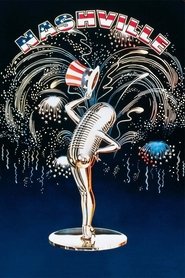— Fellow taxpayers and stockholders in America. On the first Tuesday in November, we have to make some vital decisions about our management. Let me go directly to the point…
In its demands on the audience's attention to understated detail, Nashville evokes nothing less than Tati's Playtime (1967), or perhaps even a large mural by Pieter Bruegel.
Scenes From a Marriage or A Woman Under the Influence seem to probe deeper into the human condition through the exploration of characters' backgrounds, the detailing of idiosyncracies, and the discussion of events as they happen (the dialogue is often the event itself); Nashville avoids these tendencies. Nashville does not involve so much the exposition of character transformations as it involves the observation of its consistently transparent characters as they circulate through a powerfully transformative environment.[…]
Whether or not the film and its music present an accurate portrait of Metropolitan Nashville is a green herring cast down by a redoubtable minority. Why bother to criticize Citizen Kane because it is not an "authentic" portrait of William Randolph Hearst? Let a documentary film-maker wander through Nashville or let the Chamber of Commerce commission an industrial film.
[…]
Nashville is a media event about media events and mediated non-events. Nashville is about our Total Media Surround in which ideas are produced and disseminated at such a high rate that a superstructure of mass consciousness is created which transcends interpersonal or personally assimilable communications.
[…]
Characters are unaware of, unconcerned with, or plainly hostile to any connection with the "outside world" (except as a paying, adulating audience), even though they are directly influenced and manoeuvred by larger, impersonal forces. Those characters who do express a broader, more "committed" orientation (Hal Phillip Walker, John Triplette, Opal) are shown as confused, hypocritical, manipulative, absurd and downright evil.
— Connie Byrne and William O. Lopez (Film Quarterly)
Commercially, the biggest problem with the film is that it doesn't have a shark.[…]
I didn't write that speech [by Hal Phillip Walker] and I didn't direct the man who did. I didn't give him any guidelines whatsoever. I took Thomas Hal Phillips, who is a novelist from Mississippi and who's politically oriented (his brother ran for governor down there and he managed the campaign) and is a man I respect. All these comparisons to George Wallace are just pigeonholing. I told Phillips to invent a candidate. The only requirements I gave him were that he be a third party candidate. I didn't want a Democrat or a Republican. And I told him to invent a man who he would like to see elected, and who he thought could be elected.
[…]
[Interviewer: There seems to be some confusion about who the assassin in the film was actually after.] I don't know any more than you know. People who ask, "Why did he kill her instead of the politician?" have answered the question when they asked it. That means we condone political assassination but anything else is senseless. We do accept and condone and consequently create political assassinations.
— Robert Altman (Interview in Film Quarterly)
Nashville is about the insanity of a fundamentalist culture in which practically the whole population has been turned into groupies.
— Pauline Kael (New Yorker)
[Nashville] captured the Ford administration’s blankness in its device of the faceless presidential candidate Hal Phillip Walker. In a movie filled with two dozen vivid, larger-than-life protagonists, the always campaigning yet rarely seen Walker, whose campaign is represented by an always cruising sound truck, functions as a sort of structuring absence.
— Adam Nayman (The Ringer)
If Nashville is conceivably the most exciting commercial American movie in years, this is first of all because of what it constructs, not what it exposes. [Yet] one easily sees why the film should have been much longer, and how extensively our chancy and partial experience of it is a response to work in progress, the unfolding of a narrative complex rather than its ultimate destination. Thus to stop the movie at a precise meaning — and worse yet, a sociopolitical one– is to rob it of its complexity and consign it to the same dustbin of platitudes that Opal and Hal Phillips Walker both specialize in accumulating.
Its real meat is life’s cacophony of pauses, absurdities, and loose ends, its plurality of perspectives. By rendering nothing and no one superfluous, Altman offers the sublime antithesis to the uniform, depersonalized experiences of most American movies that seek to convey and converse with the zeitgeist.
— Matthew Eng (Reverse Shot)

